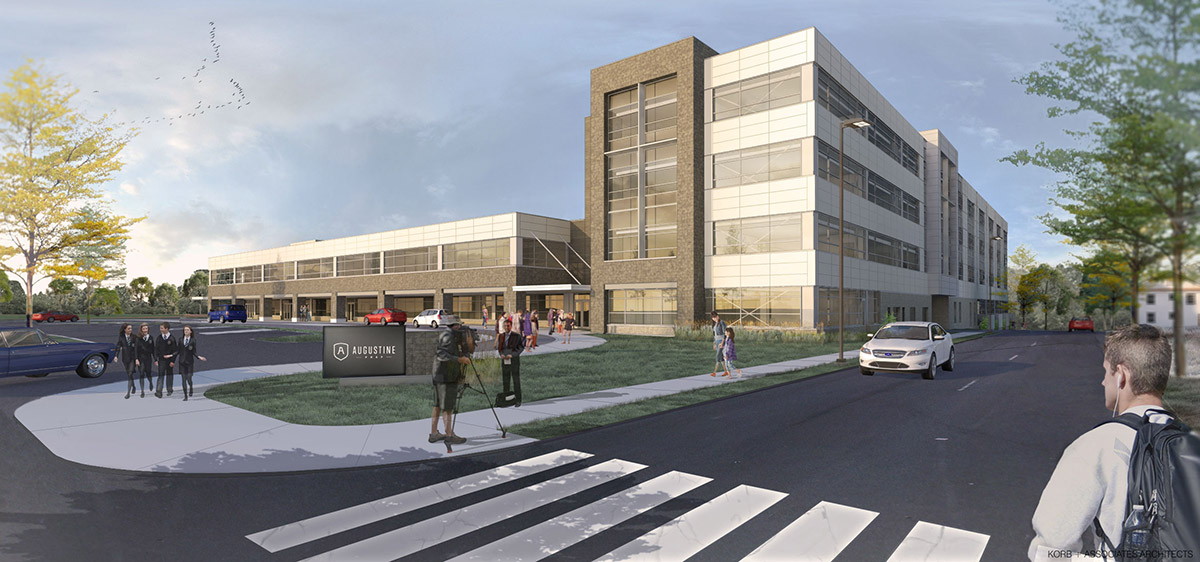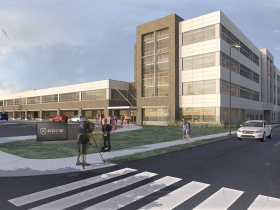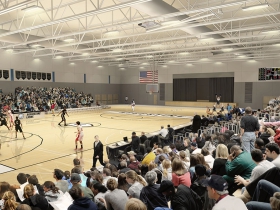Huge New Christian School Serves Latinos
St. Augustine Prep, south-side private school, has Olympic-sized pool.
St. Augustine Preparatory Academy, a new private school boasting an in-house health clinic and an Olympic-size swimming pool, will open for classes on Aug. 16 at 2607 S. 5th St. in the Lincoln Village neighborhood. St. Augustine is a non-denominational Christian school serving more than 500 students in its first year.
Eighty percent of the students live within a two-mile radius of the school building. Alfonso Carmona, superintendent of St. Augustine, said that school representatives went door to door to recruit students. They also made phone calls, used social media and held events to make sure community members knew the new $50 million building is a school, not a hospital or another large facility.
Carmona said he wants the school to be an asset to students, as well as the community. “If I want my students to do well, I need their families to do well,” Carmona said.
St. Augustine will offer English as a Second Language (ESL) and GED classes to community members. The school’s health clinic is available to students and staff as well as their families.
The school also has a new turf field for soccer and an Olympic-size swimming pool and training pool.
Christian Alvarado, who will be a freshman at St. Augustine, was accepted to several other schools, including Carmen Schools of Science and Technology, but chose St. Augustine for its academics. “I want to be an orthopedic surgeon. St. Augustine had good college prep classes.”
Said Aixa Barrios, who also will be a freshman, “I came to St. Augustine for everything it has to offer. They push you in academics and they have sports.”

Incoming students at St. Augustine attending the summer program listen attentively as their teacher reads to them. Photo by Lydia Slattery.
“I’m a big believer that students can achieve anything they want. I’m also a big believer that students can’t do it alone,” said Carmona. “They need people to guide them and show them the way.” The average class size is 20 students with two adults per classroom.
Eighty percent of the students at St. Augustine are Latino. Carmona said he expected the students to be predominantly Latino due to the school’s location on the South Side, home to a large Latino population. Twenty teachers speak Spanish and 10 are fully bilingual.
Carmona said that the school is accredited temporarily, but is in the three-year process of seeking permanent accreditation by the Wisconsin Religious and Independent Schools Accreditation. St. Augustine can accept school vouchers now.
All students at St. Augustine are receiving school vouchers, which are usually $7,500, Carmona said. Tuition for kindergarten through eighth grade is $9,500 and $10,000 for high school. St. Augustine will not charge families the difference between the voucher and the cost to educate a student, Carmona said.
A student is eligible for a school voucher if the family’s income is equal to or less than 300 percent of the federal poverty level, which is $72,900 for a family of four. Opponents of school vouchers argue that they take necessary funds away from public schools.
“If funding is taken away from public schools that could lead to a school not being able to have an art teacher or a librarian,” said Amy Mizialko, vice president of the Milwaukee Teachers Education Association.
Mizialko said that legislators, philanthropists and community members should be investing in public education. There is no strong evidence that shows private schools educate students better than public schools, she added. “The voucher system is a 25-year failed experiment.”
She added that the schools closest to St. Augustine, which include Riley Elementary, Forest Home Avenue School, Lincoln Avenue School and Allen-Field Elementary School, could lose enrollment.
According to Isral DeBruin, director of communication for Schools That Can, “It’s hard to say how [St. Augustine] will affect the enrollment of charter or public schools since the Milwaukee educational landscape is so complex.”
St. Augustine is a partner school with Schools That Can, which provides resources to help improve public, charter and private schools. DeBruin said the organization helped St. Augustine design its curriculum and hire teachers.
Mizialko noted that private schools can exclude students, a practice known as gatekeeping. Public schools are the only entities legally required to educate all students.
Carmona said he has hired four special education teachers, a speech pathologist and several social workers to meet the needs of all students at St. Augustine.
“Our school is an inclusive school. We accept all students that qualify for the Milwaukee Parental Choice Program or the Wisconsin Parental Choice Program. This includes students with disabilities,” Carmona said.
Classes at St. Augustine begin Aug. 16 with grades K4, K5, first, second, third, sixth and ninth. The school plans to enroll 2,500 students when all grade levels open by fall 2020. DeBruin said it would be one of the largest private schools in Milwaukee when it reaches its full capacity.
Schools on the South Side such as St. Anthony and Bruce Guadalupe have been welcoming to St. Augustine, DeBruin said, adding that Bruce Guadalupe, a charter school, gave its student waiting list to St. Augustine to help recruit students.
School-choice advocate Gus Ramirez, executive chairman of manufacturing company HUSCO International, donated $40 million of $53 million to build St. Augustine. The remainder was funded through donations and fundraising events, Carmona said.
Renderings
This story was originally published by Milwaukee Neighborhood News Service, where you can find other stories reporting on eighteen city neighborhoods in Milwaukee.




























